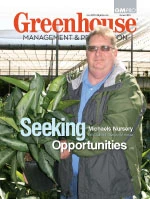 Michaels Nursery in Boynton Beach, Fla., has been serving the interiorscape industry for over 30 years. Opened in 1974, the nursery was started by brothers Jim and Gerry Leider to supply their own interiorscape company Tropical Plant Rentals in the Chicago area. The brothers sold their interiorscape business to Rentokil Initial in 1988, but continued to serve the interiorscape market with plant material.
Michaels Nursery in Boynton Beach, Fla., has been serving the interiorscape industry for over 30 years. Opened in 1974, the nursery was started by brothers Jim and Gerry Leider to supply their own interiorscape company Tropical Plant Rentals in the Chicago area. The brothers sold their interiorscape business to Rentokil Initial in 1988, but continued to serve the interiorscape market with plant material.
Michaels general manager Bill Churchill said the nursery still sells to interiorscapers, but consolidation within that industry segment has led to an expansion of the company’s customer base and product mix.
“When we moved to our current location in 2001 we focused on interiorscapers, but that has changed over the years,” Churchill said. “In the past about 80 percent of our sales went to interiorscapers. Our local business has increased a lot, which includes both interior and exterior landscapers and independent garden centers. We have actually marketed to exterior landscapers to try to get them to buy some of our interiorscape plants. We have done some local advertising to promote interior plants to exterior landscape customers to help them increase their business.”
Interiorscapers now account for about 50-55 percent of Michaels’ sales along with garden centers and small chains (25 percent), Costco stores in Florida (15 percent) and the rest going to wholesalers and rewholesalers.
Churchill said the company sells to wholesalers that sell plants to exterior landscapers especially in the spring.
“We market some of the plants as patio plants for the spring and we have also added flowering plants,” he said.
Churchill said container sizes and plant offerings have evolved along with changes in the company’s customer base.
“We try to be diverse in what we do,” he said. “Most of the flowering plants we grow now were the result of the relationship we developed with Costco. In the spring we grow a lot of flowering potted plants including Sun Parasol mandevilla and grafted gardenias that are sold to garden centers.
Foliage plants account for about 70 percent of the plants produced. Churchill said the plants are used in both interiorscapes and landscapes.
“Some of the plants are dual purpose, including various palm and ficus varieties, podocarpus trees and topiaries. They are grown outside and can be sold to landscapers or they can be acclimated in one of our shade structures and then sold to interiorscapers.”
Churchill said when the company was focused primarily on the interiorscape market it produced mostly 3- and 7-gallon size containers. Now that the grower is doing more with garden centers a switch has been made to smaller pot sizes, mostly 6- to 10-inch.
 Cruising into Central Park
Cruising into Central ParkAlthough Michaels has provided plants for large interiorscape jobs before, nothing compared to the project it became involved with in 2009. Interiorscape company Ambius, a division of Rentokil, contacted Michaels about supplying plants for the Central Park design it was installing on the Royal Caribbean International’s new Oasis of the Seas cruise ship. Extending the length of a football field, the park was the first in a series of neighborhoods that included a courtyard of tropical plants and walkways and a town square with dining and entertainment.
Ambius selected the plant species based on salt tolerance and working with USDA to find plants that wouldn’t transport pests and diseases between Florida and the Caribbean.
“The people at Ambius approached us about growing some of the plant material,” Churchill said. “It was a long, diverse list. Some of the plants were interior foliage plants and others were exterior plants such as ixora and liriope. All of the plants for the project were produced by growers in Palm Beach County.”
Ambius asked Michaels for input about the plants prior to the growers starting to produce them.
“They did a good job of matching like-type plants so that there wasn’t a full sun plant in with a deep shade plant,” Churchill said. “They did make a few substitutions, but overall they stuck to the design plan.”
In addition to growing some of the plants, Michaels also was the location where all of the finished plants, except large trees, were consolidated and planted into specially designed aluminum modules that were then installed on the ship. Churchill said there were nearly 700 pallets of finished plants that were all numbered and color coded.
“We staged the modules in our packing house, Churchill said. “From the time that we started assembling the modules until we were finished planting them took about three weeks. We handled the logistics of loading the modules onto several hundred luggage carts provided by Royal Caribbean. The carts were loaded onto 16 trucks that delivered them for installation on the ship. Most of the shipping was done in three days.”
Churchill said the timing of the job couldn’t have been better. It was Michaels’ biggest single project for the year. Churchill said the cost for the plants alone was about $15,000.
“When we were planting up the modules it was at a time of year when business is typically a little slower for us,” he said. “This job actually kept us from having to lay off any workers. We shipped the plants during the first week of November.”
Michaels will be working with Ambius on another cruise ship project. Royal Caribbean plans to launch a sister ship Allure of Seas in 2011.
Michaels has also become involved with GSky, a company in Vancouver, British Columbia, that manufactures and installs green walls. Churchill said GSky is a relatively new company that he has been working with for about a year. Michaels has been growing tropical and landscape plants that fit into wall panels that are 1-foot square and have holes that hold 13 2-inch liners.
“It has helped that we grow smaller plant material,” Churchill said. “The bigger the plants the longer it takes to make changes.”
Michaels has shipped a 400-square-foot wall to the Microsoft Envisioning Center in Redmond, Wash., which contained Ficus pumila plants. An exterior green wall that contained two kinds of jasmine was grown for the W Hotel in Fort Lauderdale.
“The ficus for the Microsoft project is a plant that we normally produce. Most of the jobs we have done so far have been with plants that we don’t normally grow,” Churchill said. “Initially they provided the starter plant material and we finish it. It’s an emerging business so we are working to provide ourselves with more lead time. This will enable us to propagate and finish the plants ourselves.”
Michaels has worked with Ambius on an interior 3,600-square-foot green wall for Longwood Gardens in Kennett Square, Pa.
“A number of representatives from Longwood came down last year and toured our facility,” Churchill said. “For this particular job we grew a lot of the plant material from cuttings.
“We are looking at any new revenue stream that we can find. Since the technology for the green walls is still relatively new, the design and installation costs can be prohibitive factors. Right now large companies and hotels are doing many of them. As the technology improves and the costs come down, I expect they will become more common place.”
For more: Michaels Nursery, (561) 734-3110; www.michaelsnurseryflorida.com. GSky, (888) 708-4759; www.gsky.com.

Explore the June 2010 Issue
Check out more from this issue and find your next story to read.
Latest from Greenhouse Management
- pH Helpers
- Society of American Florists accepting entries for 2025 Marketer of the Year Contest
- Sustainabloom launches Wholesale Nickel Program to support floriculture sustainability
- American Horticultural Society welcomes five new board members
- Color Orchids acquires Floricultura Pacific, becoming largest orchid supplier in U.S.
- American Floral Endowment establishes Demaree Family Floriculture Advancement Fund
- The Growth Industry Episode 3: Across the Pond with Neville Stein
- 2025 State of Annuals: Petal power







